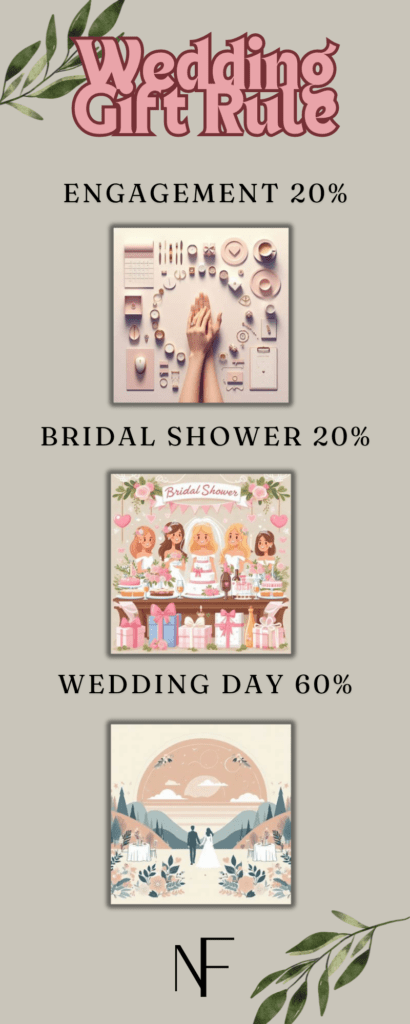Navigating Wedding Gift Expenses
Weddings are beautiful celebrations, but they can also come with a hefty price tag for guests, especially for young families balancing budgets and responsibilities. The pressure to give the “right” gift can feel overwhelming, but there are flexible guidelines to help you navigate this tricky terrain without breaking the bank. Whether you’re attending multiple wedding events or a destination wedding, this guide will help you find the perfect balance between tradition, modern expectations, and your personal finances to answer how much to spend on a wedding gift.
Average Spending on Wedding Gifts
The amount you spend on a wedding gift can vary greatly depending on several factors, but the average tends to fall between $100 and $150 per guest (Brides). These guidelines can help you make decisions, but it’s important to adjust based on your relationship with the couple:
- Coworkers and distant relatives: $50 to $75 (Brides).
- Friends: $75 to $100 (thoughtfulgiftlab.com –,Brides).
- Close family and best friends: $100 to $200 or more (thoughtfulgiftlab.com –,Martha Stewart).
These amounts typically refer to the wedding day gift itself. However, there are often other wedding-related events like engagement parties and bridal showers, which may also involve gifts. It’s important to remember that not everyone is invited to these events—for example, bridal showers are often more intimate, and only close friends and family might be included (Brides). Similarly, engagement gifts are generally not expected or mandated, making them an optional expense depending on your relationship with the couple (Martha Stewart).
With this in mind, consider the above amounts as representing the 60% portion of your total budget for all wedding-related gifts. The remaining 40% can be divided between other events, if you’re invited, and as your budget allows.
The 20-20-60 Rule for How Much to Spend on Wedding Gift, Bridal Shower, and Engagement
Managing your gift budget across multiple events like the engagement party, bridal shower, and wedding day can feel overwhelming. The 20-20-60 rule can help you distribute your spending:
- 20% of your total budget on an engagement gift (if you choose to give one),
- 20% on a bridal shower gift (if you’re invited),
- 60% on the wedding gift (zola.com).

This framework helps ensure that your total gift spending stays balanced and within your means. Remember, how much you spend should ultimately be tied to your relationship with the couple and your personal budget. If you’re close to the couple and feel inclined to participate in every event, the 20-20-60 rule can guide you. However, if you’re only attending the wedding or feel that you can’t comfortably afford gifts for every event, it’s okay to adjust your spending or focus on the main event—the wedding day itself.
Ditch the “Cover Your Plate” Rule
In the past, guests often tried to match their gift to the estimated cost of their meal at the wedding. This “price-per-plate” guideline is now considered outdated. Instead, focus on your relationship with the couple and what you can comfortably give. This approach allows for more flexibility and reduces unnecessary pressure (Martha Stewart).
Cash Gifts and Digital Alternatives
Cash gifts have become increasingly popular, especially as more couples live together before getting married and may prefer contributions toward a honeymoon or home fund over physical items. Many couples now offer digital cash options, making it easier for guests to give directly (Wedding Forward, Brides).
If you’re opting for cash, it’s a good idea to send it before the wedding or contribute to a specific fund, such as a honeymoon registry. This approach is practical and appreciated, especially for couples who may not need more household items.
Registry Etiquette: To Stick or Not to Stick?
While sticking to the registry is always a safe bet, particularly for distant friends or relatives, it’s not a strict rule. If you know the couple well and can pick a personalized or creative gift that suits their tastes, feel free to go off-registry. Just ensure that the gift is thoughtful and aligns with their lifestyle (thoughtfulgiftlab.com –, Brides).
If the registry items are beyond your budget, consider contributing to a group gift with other guests. This allows you to give something meaningful without stretching your finances (Wedding Forward).
Handling Special Wedding Situations
Destination Weddings
Destination weddings come with added expenses for guests, such as travel and lodging. In these cases, it’s perfectly acceptable to give a smaller gift or no gift at all. The couple likely understands that attending the wedding is a significant contribution in itself (Wedding Forward).
Weddings You Can’t Attend
If you’re unable to attend the wedding, sending a gift is still a kind gesture, though it doesn’t need to be as expensive as if you were attending. A thoughtful card and a small token or gift card can suffice (Wedding Forward, Brides).
Last-Minute and Late Gifts
If you missed giving a gift on the wedding day, don’t worry—etiquette generally allows for up to three months after the event to send your gift. Just ensure it’s thoughtful and timely, so it doesn’t feel like an afterthought (zola.com).
How Much to Spend on Bridesmaid, Groomsman, and Bridal Shower Gifts
Bridesmaid and Groomsman Gifts
If you’re part of the wedding party, the general spending range for bridesmaid or groomsman gifts is between $75 and $150. These gifts should be both meaningful and practical, ideally personalized to reflect your close relationship with the bride or groom (thoughtfulgiftlab.com –, Martha Stewart).
Bridal Shower Gifts
For bridal showers, gifts typically fall in the $50 to $100 range. If the bride has a registry, sticking to it is a safe option. However, a personalized gift that reflects your relationship with the bride can also be a great choice (Brides).
Creative and Personalized Gift Ideas
Not every gift needs to come from a store. Consider creative alternatives, especially if you’re on a budget:
- Offer Services: Babysitting, house-sitting, or home improvement services can be invaluable gifts (zola.com).
- Experiential Gifts: Vouchers for a date night, spa day, or family activity can be more memorable than material items (Wedding Forward).
- DIY Gifts: Handmade items, such as personalized photo albums or home decor, can add a personal touch that store-bought gifts might lack.
11 Important Questions on How Much to Spend on a Wedding Gift
- How much should I spend on a wedding gift?
The average spending on a wedding gift is typically between $100 and $150 per guest, but you should adjust this amount based on your relationship with the couple and your personal budget: $50 to $75 for coworkers and distant relatives, $75 to $100 for friends, and $100 to $200 or more for close family and best friends. (Brides). - Should I give a wedding gift if I’m not attending the wedding?
Yes, it’s still thoughtful to send a gift even if you’re unable to attend. The size of the gift can be smaller than if you were attending. A heartfelt card or a smaller token, such as a gift card, is often sufficient (Wedding Forward, Brides). - Do I need to buy a gift for every wedding event I’m invited to?
It’s generally expected to bring a gift to major events like the bridal shower and the wedding itself. However, engagement gifts are optional, and you don’t need to bring gifts to every event, such as an engagement party, unless you feel particularly close to the couple (zola.com). - Is it okay to give a group wedding gift?
Absolutely! Group gifting is a great way to contribute to a larger or more expensive item on the couple’s registry without overspending. This is especially popular among members of the bridal party (Wedding Forward). - Can I give cash as a wedding gift?
Yes, cash gifts are increasingly common and often preferred by couples who might be saving for a big expense like a honeymoon or a new home. Just ensure you give it in a thoughtful manner, either via a card, a digital payment method, or a registry fund (Wedding Forward). - What if I can’t afford to give much?
Prioritize your budget and give what you can afford. It’s more important that you’re there to celebrate with the couple. If finances are tight, consider giving a smaller, personalized gift, or even offering a service like babysitting or house-sitting instead (zola.com, Brides). - How late can I send a wedding gift?
While it’s ideal to give a gift before or on the wedding day, you generally have up to three months post-wedding to send a gift. Just be sure it’s done within a reasonable timeframe to avoid appearing as an afterthought (zola.com). - Should I bring my wedding gift to the event or send it beforehand?
It’s usually more convenient for the couple if you send the gift before the wedding, especially if it’s a larger item. However, if you’ve purchased a smaller, more personal gift or aren’t using the registry, bringing it to the event is also acceptable (zola.com). - What should I do if the registry items are out of my budget?
If the items on the registry are too expensive, consider pooling resources with other guests for a group gift. Alternatively, you can choose a smaller, off-registry item that’s still meaningful and useful to the couple (Wedding Forward). - Is it okay to give a wedding gift that isn’t on the registry?
Yes, but proceed with caution. If you know the couple well and are confident in your choice, an off-registry gift can be a hit. However, it’s generally safer to stick to the registry unless you’re sure the couple will appreciate the item (Wedding Forward). - What if I’m invited to a destination wedding? Do I still need to give a gift?
For destination weddings, your presence is often considered gift enough, especially given the travel and accommodation costs involved. However, if you’d still like to give a gift, something smaller and meaningful is perfectly acceptable (Wedding Forward).
Finding the Right Balance
In the end, the best wedding gift is one that reflects your relationship with the couple and fits within your budget. Whether you stick to the registry, opt for cash, or choose a creative alternative, remember that it’s the thought and effort that counts when choosing how much to spend on a wedding gift. Weddings are about celebrating love and connection, and your presence and thoughtful gesture—no matter the cost—will be appreciated by the happy couple.
By following these guidelines, you’ll navigate the complexities of wedding gift-giving with confidence, staying financially responsible while making meaningful contributions to the couple’s special day.
Loved our guide on wedding gifts? Ready to take the next big step? Dive into our expert advice on engagement rings and make your proposal unforgettable. Discover how much to spend on an engagement ring and start your journey to “I do” with confidence!
About the Authors: We’re a husband and wife team with over 30 years of experience in finance, investments, and marketing, committed to helping growing families make informed decisions. Think of us as that older sibling who’s been through it before and ready to share our mistakes and successes. Learn more about our journey from insecurity to financial security where we conquered adversity to reach the top 10% of our peers.


Leave a Reply